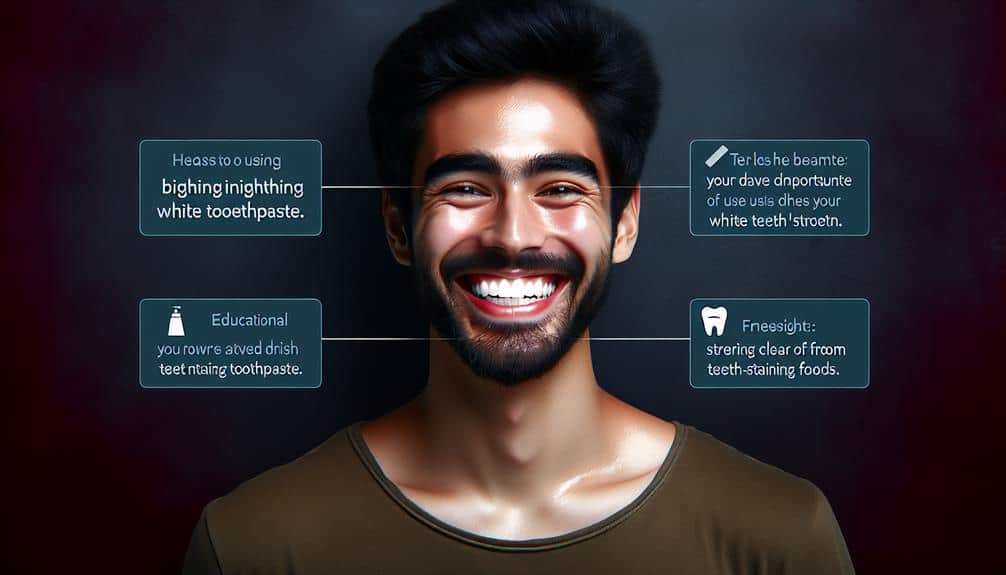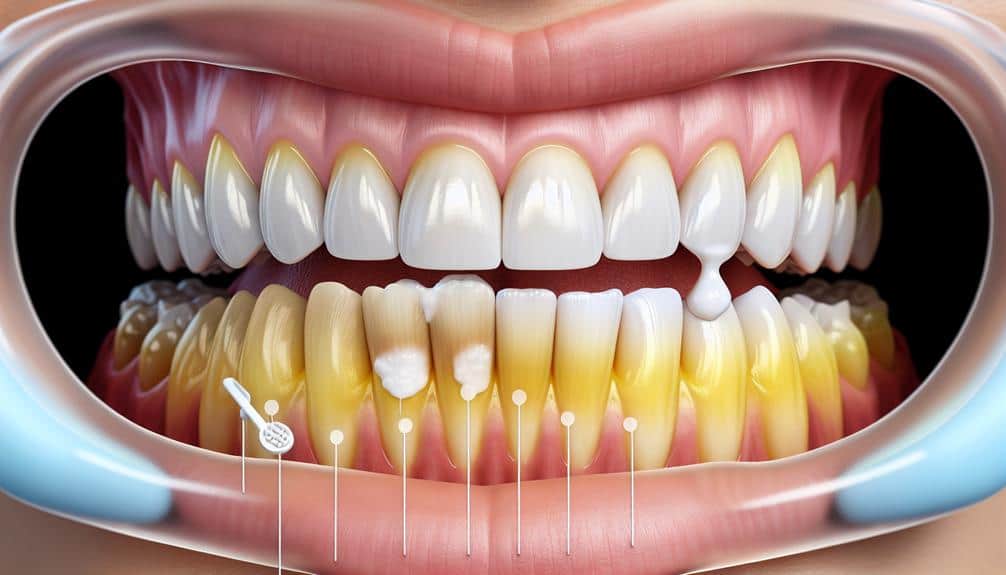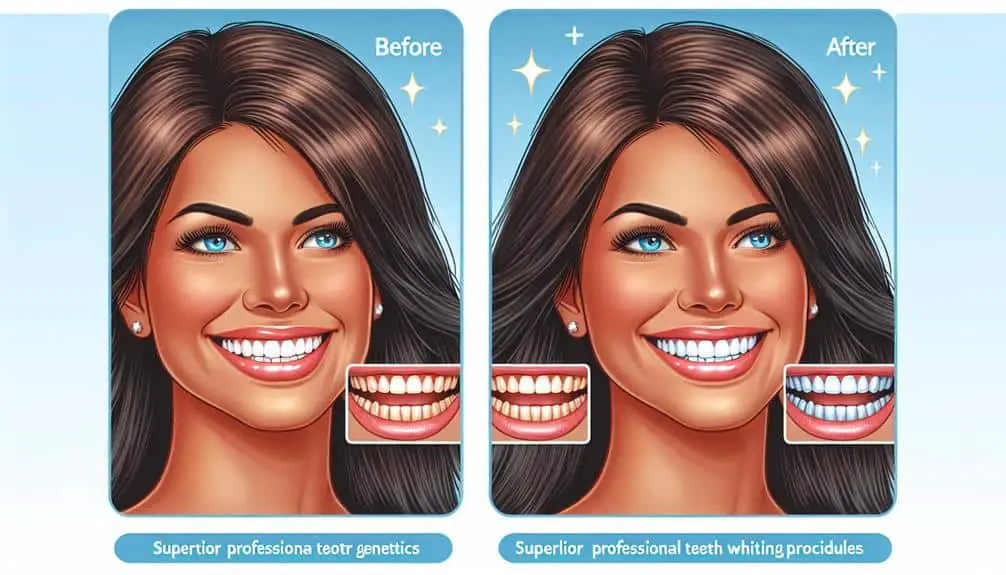To brighten genetic teeth discoloration, consider professional whitening treatments for precise results. Try at-home kits with LED technology for cost-effective solutions. Use whitening toothpaste and mouthwash to maintain brightness. Embrace natural remedies, like fruit peels, for gradual improvement. Explore dental veneers and bonding for long-lasting changes. Effective options exist to enhance your smile.
Key Points
- Professional whitening treatments target genetic discoloration effectively in a single visit.
- At-home whitening kits offer cost-effective solutions for genetic teeth stains.
- Whitening toothpaste and mouthwash maintain results with enamel-safe ingredients.
- Natural remedies like fruit peels and oil pulling gradually whiten teeth over time.
- Dental veneers and bonding provide long-lasting solutions for genetic discoloration.
Professional Whitening Treatments
When considering professional whitening treatments for genetic teeth discoloration, consult with a dental professional to determine the most suitable approach for your specific needs. In-office procedures offer effective solutions for addressing genetic teeth discoloration. One popular method involves laser treatments, which are performed by trained professionals in a controlled environment. Laser treatments target deep-set stains in the enamel and dentin of the teeth, providing efficient and long-lasting results.
During an in-office laser treatment, a dental professional will apply a whitening agent to your teeth and then use a specialized laser to activate the whitening process. This targeted approach allows for precise treatment of discolored areas while minimizing the risk of damage to surrounding tissues. The procedure is typically completed in a single visit, making it a convenient option for individuals looking to achieve a brighter smile in a short amount of time.
Before undergoing any professional whitening treatment, it's essential to have a thorough consultation with your dentist to assess your oral health and determine the most suitable approach for your specific case.
At-Home Whitening Kits
For individuals looking to whiten their teeth at home, consider exploring the effectiveness of at-home whitening kits formulated to address genetic teeth discoloration. At-home whitening kits have become increasingly popular due to their convenience and cost-effectiveness compared to professional treatments. These kits typically contain whitening gel or strips that help remove stains and brighten your smile in the comfort of your own home.
One of the DIY whitening trends gaining traction is the use of at-home LED teeth whitening kits. These kits use blue light technology to enhance the whitening process, providing quicker results. Additionally, some whitening kits include custom trays that mold to your teeth, ensuring even application of the whitening agent for best outcomes.
To uncover brightening smile secrets with at-home whitening kits, careful adherence to the guidelines is crucial to avoid potential side effects like tooth sensitivity or gum irritation. Consistency is key, so make sure to use the kit as recommended to achieve a whiter, brighter smile.
Whitening Toothpaste and Mouthwash
Consider enhancing your at-home teeth whitening routine by incorporating whitening toothpaste and mouthwash to further brighten your smile. Whitening toothpaste and mouthwash are convenient options that can complement professional treatments or at-home kits. When selecting these products, look for ones that are specifically formulated for whitening and contain ingredients that help remove surface stains effectively. It's essential to choose enamel-safe products to prevent any damage to your teeth.
Whitening toothpaste often contains mild abrasives or polishing agents that help to scrub away stains from the surface of your teeth. Additionally, these toothpaste products may include hydrogen peroxide or other whitening agents to brighten your smile gradually. Similarly, whitening mouthwashes can reach areas that toothpaste might miss, providing an extra layer of whitening power to your oral care routine.
While whitening toothpaste and mouthwash can be effective in improving the brightness of your teeth, they aren't as potent as professional treatments. However, for maintaining results or as part of your DIY whitening remedies, incorporating these enamel-safe products can be a valuable addition to your oral care regimen.
Natural Remedies for Discoloration
To address teeth discoloration naturally, explore incorporating proven home remedies into your oral care routine. Fruit peels, such as those from oranges or lemons, contain natural whitening agents like d-limonene that can help combat discoloration. Rubbing the inside of the peel gently against your teeth or exploring a paste from dried and powdered peels can aid in brightening your smile over time.
Another natural method to explore is oil pulling, a traditional Indian folk remedy that involves swishing oil around in your mouth to remove bacteria and stains. Coconut oil is commonly used for this purpose due to its pleasant taste and potential antimicrobial properties. Research suggests that oil pulling may help reduce plaque and improve overall oral health, potentially leading to a brighter appearance.
While these natural remedies may not provide instant results like professional treatments, exploring them into your routine can contribute to a healthier, whiter smile over time.
Dental Veneers and Bonding
Dental veneers and bonding are cosmetic dental procedures that can effectively enhance the appearance of your teeth by correcting imperfections and discoloration. Dental veneers offer various benefits, such as improving the color, shape, size, or length of your teeth. They're custom-made shells that cover the front surface of your teeth, providing a natural and aesthetically pleasing look. Veneers are stain-resistant and can last for many years with proper care.
On the other hand, dental bonding involves applying a tooth-colored resin material to your teeth, which is then hardened with a special light. This process helps repair chipped, cracked, or discolored teeth, improving their appearance. While bonding is less expensive than veneers, it may not last as long and can be more prone to staining. However, bonding is a quick and effective solution for minor cosmetic issues.
Both dental veneers and bonding are viable options to enhance the look of your teeth, but consulting with a dentist is crucial to determine the best treatment for your specific needs.
Frequently Asked Questions
Can Genetics Play a Role in How Effective Professional Whitening Treatments Are for Genetic Teeth Discoloration?
Genetic predisposition does influence whitening results. Professional treatments may vary in effectiveness due to genetic factors. Consider consulting with a specialist to tailor a treatment plan that addresses your unique genetic teeth discoloration concerns.
Are There Any Specific Ingredients in At-Home Whitening Kits That Are More Effective for Genetic Teeth Discoloration?
When it comes to at-home whitening kits, specific ingredients can make a significant difference in whitening effectiveness. Look for products with potent bleaching agents like hydrogen peroxide for more noticeable results on genetic teeth discoloration.
How Long Do the Effects of Whitening Toothpaste and Mouthwash Last for Genetic Teeth Discoloration?
For genetic teeth discoloration, the effects of whitening toothpaste and mouthwash generally last for a few weeks to a month. Long-term results depend on consistent use and lifestyle habits. Regular maintenance is key for sustained improvement.
Are There Any Natural Remedies That Specifically Target Genetic Teeth Discoloration?
For genetic teeth discoloration, natural remedies like baking soda and hydrogen peroxide can be effective. These home remedies may show results, but consult a dentist for professional advice on the best approach.
Can Dental Veneers or Bonding Be Used as a Permanent Solution for Genetic Teeth Discoloration?
When considering veneers vs. bonding for genetic discoloration, veneers offer long-term success. Veneers are a durable and effective option for permanently improving the appearance of discolored teeth caused by genetic factors.



